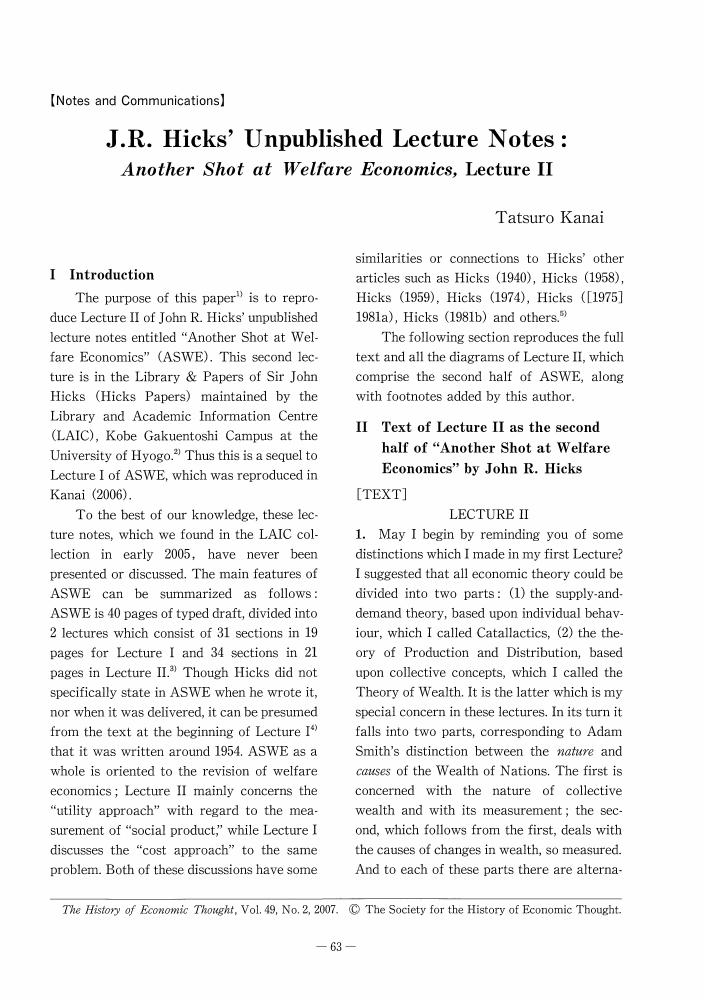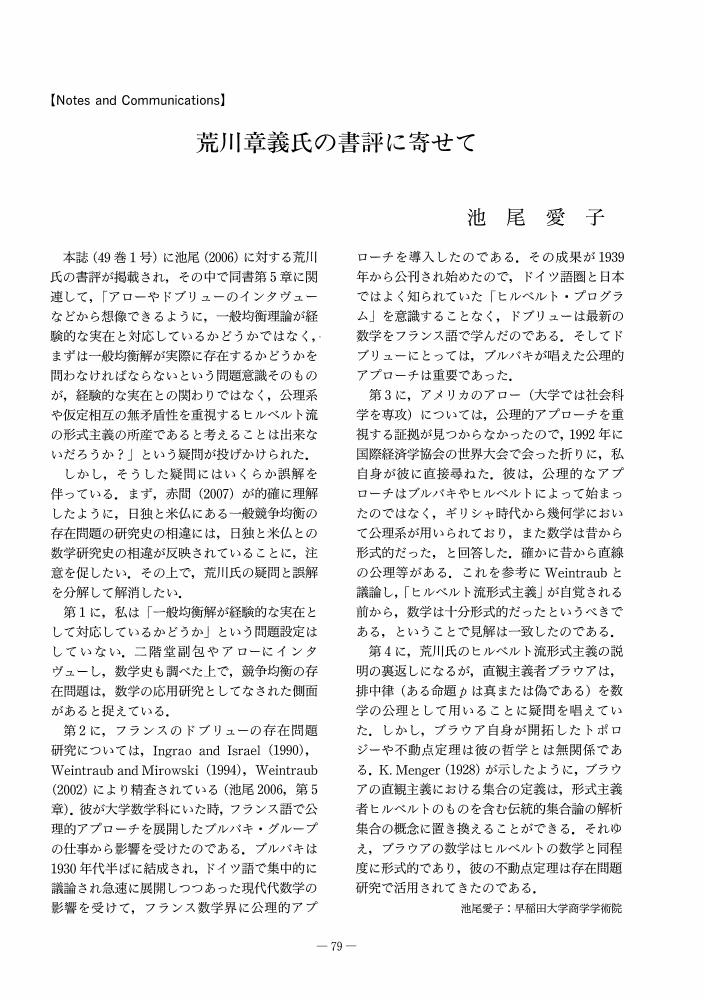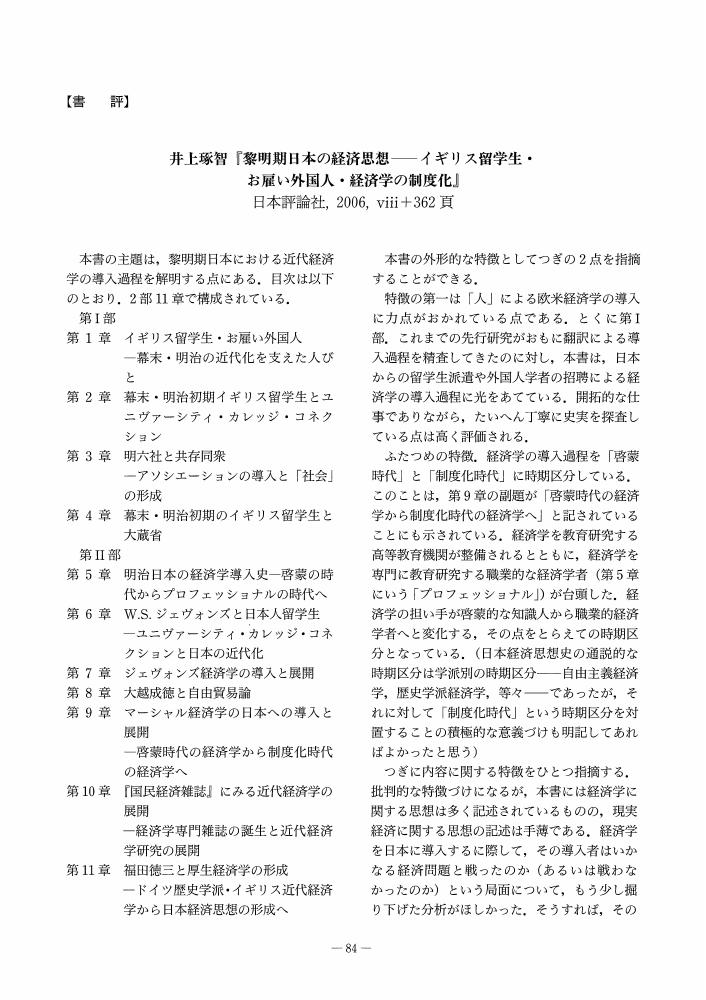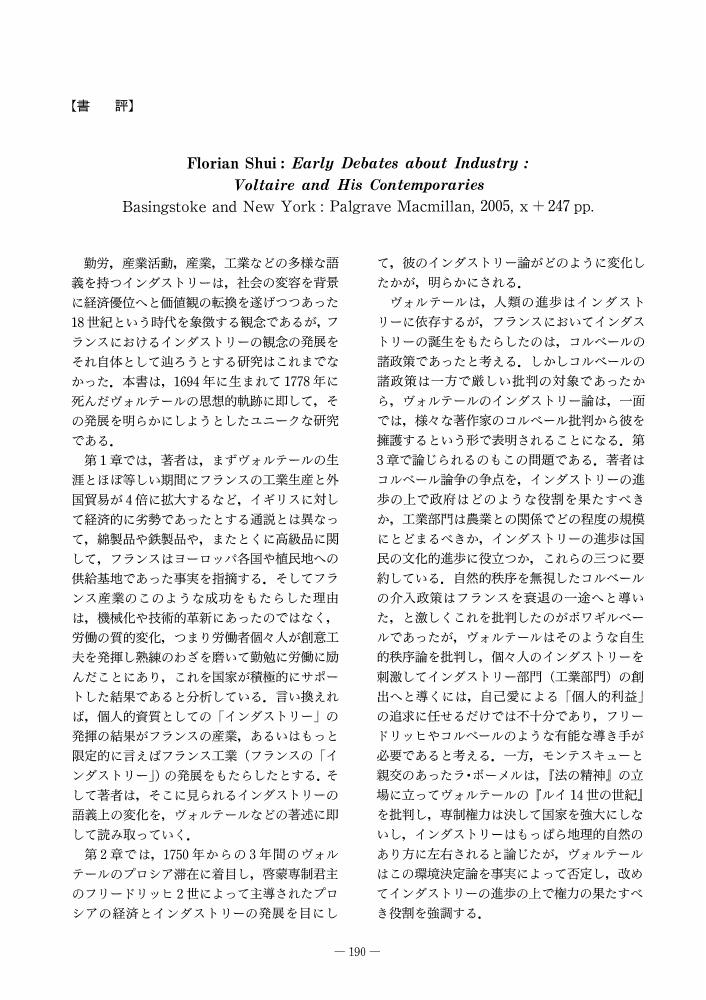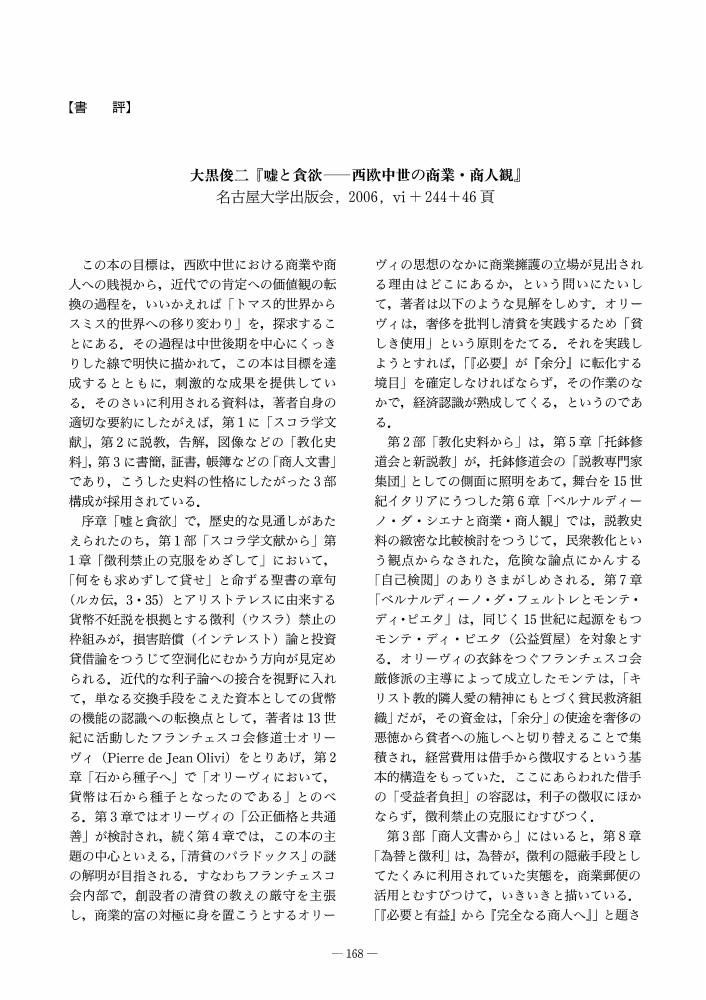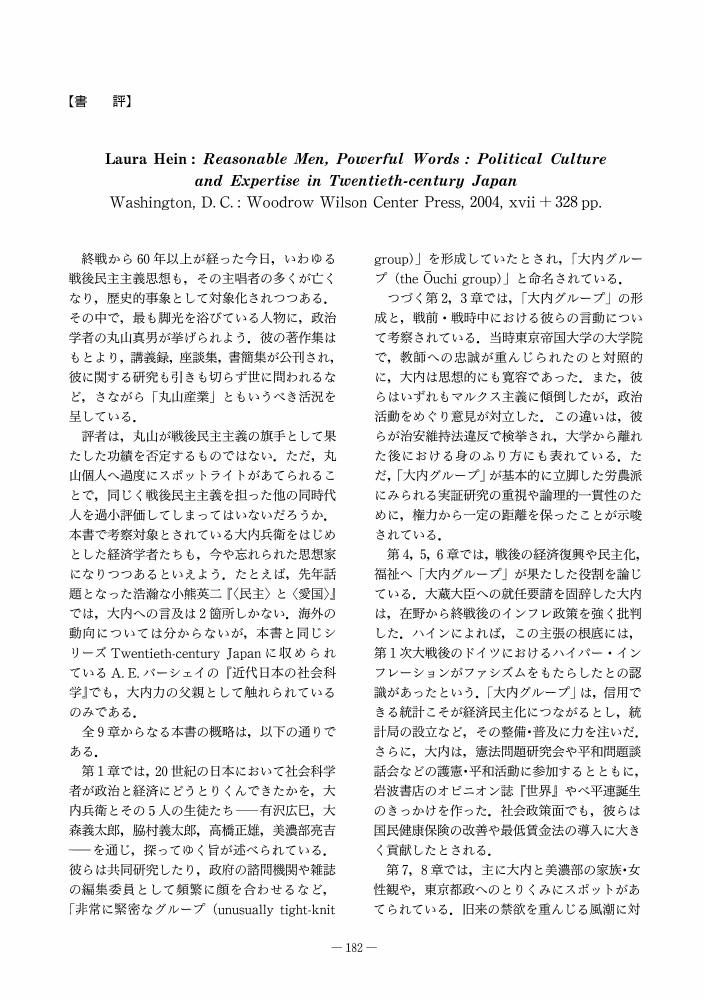- 著者
- 篠原 久
- 出版者
- 経済学史学会
- 雑誌
- 経済学史研究 (ISSN:18803164)
- 巻号頁・発行日
- vol.49, no.2, pp.88-89, 2007-12-25 (Released:2010-08-05)
- 著者
- Tatsuro Kanai
- 出版者
- The Japanease Society for the History of Economic Thought
- 雑誌
- 経済学史研究 (ISSN:18803164)
- 巻号頁・発行日
- vol.49, no.2, pp.63-78, 2007-12-25 (Released:2010-08-05)
- 参考文献数
- 18
1 0 0 0 OA 荒川章義氏の書評に寄せて
- 著者
- 池尾 愛子
- 出版者
- 経済学史学会
- 雑誌
- 経済学史研究 (ISSN:18803164)
- 巻号頁・発行日
- vol.49, no.2, pp.79-80, 2007-12-25 (Released:2010-08-05)
- 参考文献数
- 6
- 著者
- 伊藤 誠一郎
- 出版者
- 経済学史学会
- 雑誌
- 経済学史研究 (ISSN:18803164)
- 巻号頁・発行日
- vol.49, no.2, pp.82-83, 2007-12-25 (Released:2010-08-05)
- 著者
- 藤井 隆至
- 出版者
- 経済学史学会
- 雑誌
- 経済学史研究 (ISSN:18803164)
- 巻号頁・発行日
- vol.49, no.2, pp.84-85, 2007-12-25 (Released:2010-08-05)
- 著者
- 姫野 順一
- 出版者
- 経済学史学会
- 雑誌
- 経済学史研究 (ISSN:18803164)
- 巻号頁・発行日
- vol.49, no.2, pp.86-87, 2007-12-25 (Released:2010-08-05)
- 著者
- 伊藤 宣広
- 出版者
- The Japanease Society for the History of Economic Thought
- 雑誌
- 経済学史研究 (ISSN:18803164)
- 巻号頁・発行日
- vol.49, no.2, pp.94-95, 2007-12-25 (Released:2010-08-05)
- 著者
- 柳田 芳伸
- 出版者
- The Japanease Society for the History of Economic Thought
- 雑誌
- 経済学史研究 (ISSN:18803164)
- 巻号頁・発行日
- vol.49, no.1, pp.186-187, 2007-06-30 (Released:2010-08-05)
- 著者
- 米田 昇平
- 出版者
- The Japanease Society for the History of Economic Thought
- 雑誌
- 経済学史研究 (ISSN:18803164)
- 巻号頁・発行日
- vol.49, no.1, pp.190-191, 2007-06-30 (Released:2010-08-05)
- 著者
- 佐々木 憲介
- 出版者
- The Japanease Society for the History of Economic Thought
- 雑誌
- 経済学史研究 (ISSN:18803164)
- 巻号頁・発行日
- vol.49, no.1, pp.188-189, 2007-06-30 (Released:2010-08-05)
1 0 0 0 OA ヴェブレンによるイギリス経済思想史解釈の意義
- 著者
- 石田 教子
- 出版者
- The Japanease Society for the History of Economic Thought
- 雑誌
- 経済学史研究 (ISSN:18803164)
- 巻号頁・発行日
- vol.49, no.2, pp.18-34, 2007-12-25 (Released:2010-08-05)
- 参考文献数
- 45
This paper is a reconsideration of Thorstein Veblen's interpretation of British economic thought, focusing mainly on a three-paper series entitled “The Preconceptions of Economic Science” (1899-1900). Veblen has been described as a critic of almost all economic schools. He was so iconoclastic that even Hobson, who was sympathetic, tried to restrain his attacks on orthodox economics. If we study Veblen's work carefully, however, we also find an underlying positive construction. I believe that the emphasis on his heterodoxy prevents us from understanding the full implications of his scientific conception. My objective here is not only to deal with Veblen's negative critiques, but also to lay out his positive assessments, bearing in mind the influence of his early philosophical study of Kant (1884). Little attention has been given so far to developing such a perspective.I conclude that while Veblen had the temerity to criticize all British economic thought, he judged the values of each theoretical formulation with impartiality and offered a glimpse at the direction in which the economics of the time would evolve. First, according to Veblen, Hume and Smith were superior to the Physiocrats in the sense that they approached their socio-economic formulations with a “matter-of-fact animus” and tended to regard human actions as the central focus. Second, he admitted that the analysis of man in post-Bentham economics represented a positive shift in viewpoint from the teleological to the causal, although it could deal only with passive economic man in the abstract, not with active human conduct in real life. Third, he understood the theoretical significance of Mill's sophisticated utilitarian psychology and Cairnes' consideration for various human motives and actions. It is, in fact, likely that these points of view were close to, if not exactly the same as, Veblen's in his analysis of the consumer in The Theory of the Leisure Class (1899). What I aim to demonstrate in this paper is that a reconsideration of Veblen's positive responses to orthodox theories can lead to a better understanding of his place in the history of economic thought.
1 0 0 0 OA N. D. コンドラチエフとS. デ・ヴォルフの大循環研究
- 著者
- 大槻 忠史
- 出版者
- The Japanease Society for the History of Economic Thought
- 雑誌
- 経済学史研究 (ISSN:18803164)
- 巻号頁・発行日
- vol.49, no.2, pp.35-51, 2007-12-25 (Released:2010-08-05)
- 参考文献数
- 59
This paper is a comparative study of the theories of major cycles advanced by Nikolai D. Kondratiev and Salomon de Wolff, mainly in the 1920s. Establishing the problem and its setting, the author argues in the first section that hitherto both theories, despite an important difference between them, have generally been understood to be the same endogenous cycle theory explaining change in durable capital goods.In order to make that difference clear, the second and third sections investigate the analyses and theories of Kondratiev and De Wolff, respectively. Chapter 3 also includes an overview of De Wolff's career, which is still not widely known. Both economists concluded that major cycles are caused by the replacement of durable and obsolescent capital goods. Judging only from their conclusions, the theories appeared to be similar, but, as De Wolff pointed out, they differed in a significant way.That difference is explored in section 4, first, by examining Tinbergen's attempt at distinguishing the theories, which was not successful only because Tinbergen lacked adequate knowledge of Kondratiev's works and ended up proceeding from a misinterpretation of them. Second, the author investigates the difference from the point of view of De Wolff. Briefly, De Wolff confirmed statistically that the life of long-lived fixed capital, which he calculated on the basis of average depreciation rates, corresponded 'exactly' to the actual length of major cycles. Thereupon he asserted that he had established the relationship between major cycles and durable capital goods. Kondratiev, on the other hand, showed the probable length of major cycles only empirically. This is where the difference lies, and where De Wolff's unrecognized contribution to cycle theory proves to be so important.
- 著者
- 御崎 加代子
- 出版者
- The Japanease Society for the History of Economic Thought
- 雑誌
- 経済学史研究 (ISSN:18803164)
- 巻号頁・発行日
- vol.49, no.1, pp.192-193, 2007-06-30 (Released:2010-08-05)
- 著者
- 福田 進治
- 出版者
- The Japanease Society for the History of Economic Thought
- 雑誌
- 経済学史研究 (ISSN:18803164)
- 巻号頁・発行日
- vol.49, no.1, pp.180-181, 2007-06-30 (Released:2010-08-05)
- 著者
- 佐藤 方宣
- 出版者
- The Japanease Society for the History of Economic Thought
- 雑誌
- 経済学史研究 (ISSN:18803164)
- 巻号頁・発行日
- vol.49, no.1, pp.178-179, 2007-06-30 (Released:2010-08-05)
- 著者
- 小島 修一
- 出版者
- The Japanease Society for the History of Economic Thought
- 雑誌
- 経済学史研究 (ISSN:18803164)
- 巻号頁・発行日
- vol.49, no.1, pp.174-175, 2007-06-30 (Released:2010-08-05)
- 著者
- 高 哲男
- 出版者
- 経済学史学会
- 雑誌
- 経済学史研究 (ISSN:18803164)
- 巻号頁・発行日
- vol.49, no.1, pp.170-171, 2007-06-30 (Released:2010-08-05)
- 著者
- 堀田 誠三
- 出版者
- 経済学史学会
- 雑誌
- 経済学史研究 (ISSN:18803164)
- 巻号頁・発行日
- vol.49, no.1, pp.168-169, 2007-06-30 (Released:2010-08-05)
- 著者
- 武藤 秀太郎
- 出版者
- The Japanease Society for the History of Economic Thought
- 雑誌
- 経済学史研究 (ISSN:18803164)
- 巻号頁・発行日
- vol.49, no.1, pp.182-183, 2007-06-30 (Released:2010-08-05)
- 著者
- 柳沢 哲哉
- 出版者
- The Japanease Society for the History of Economic Thought
- 雑誌
- 経済学史研究 (ISSN:18803164)
- 巻号頁・発行日
- vol.49, no.1, pp.184-185, 2007-06-30 (Released:2010-08-05)

